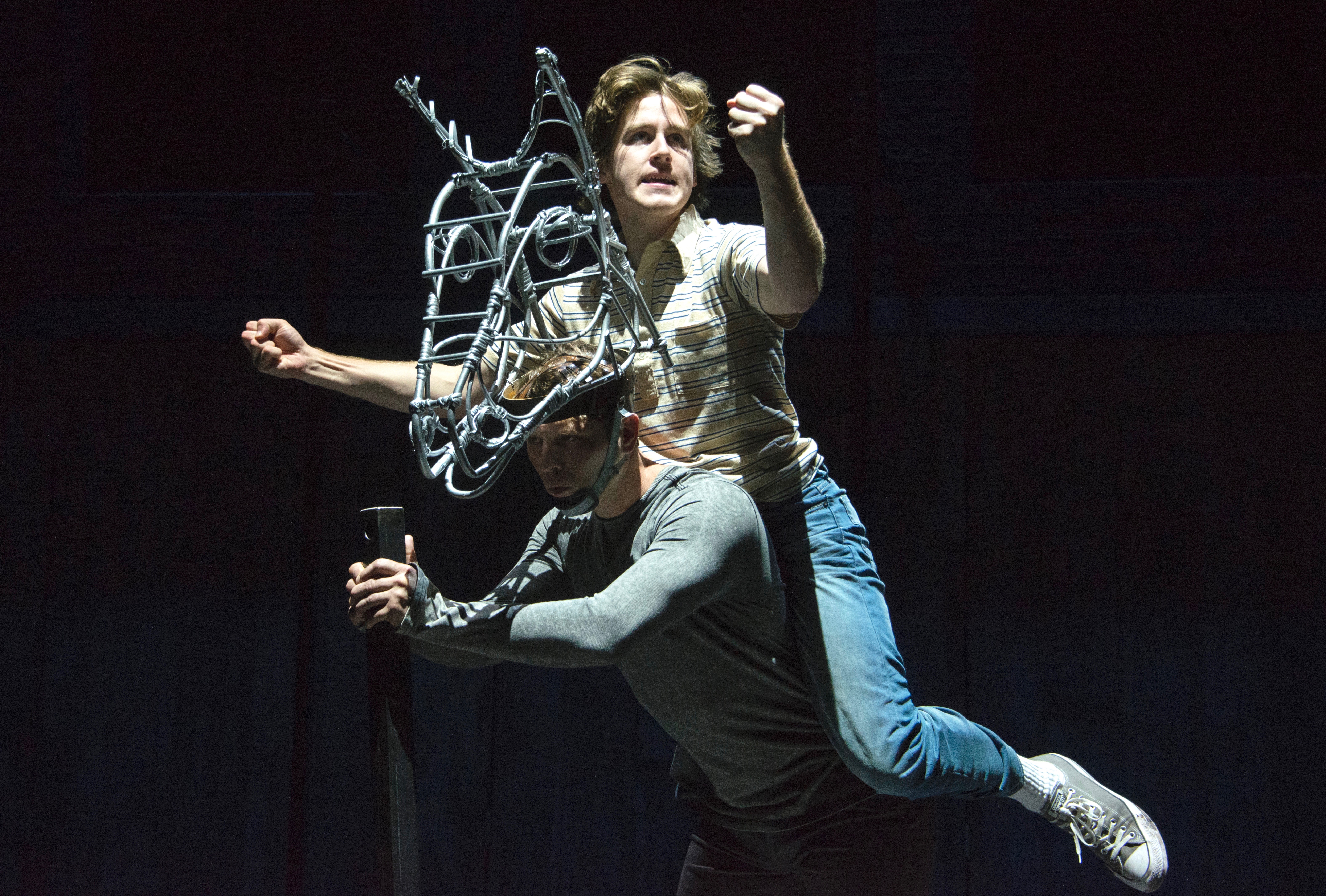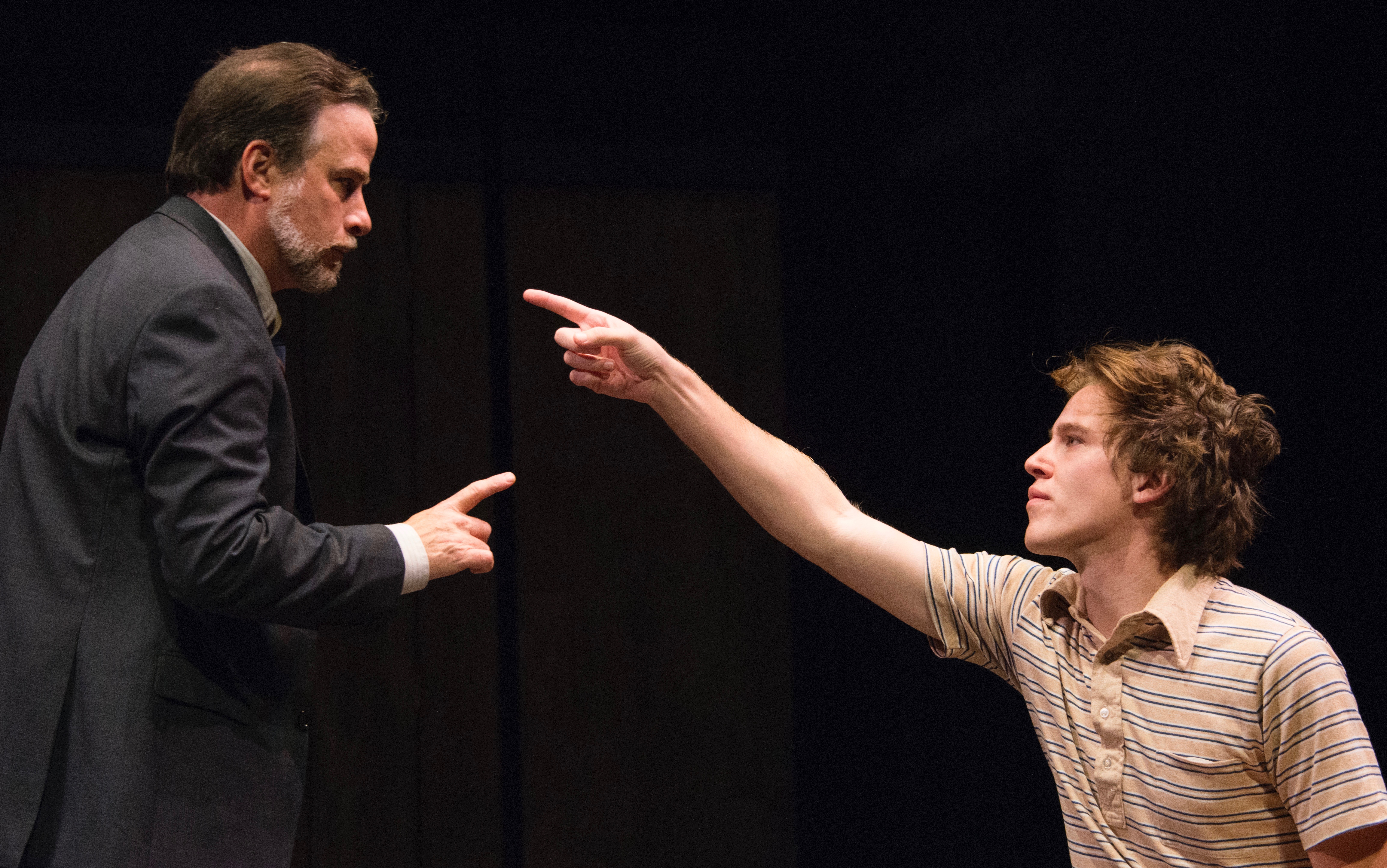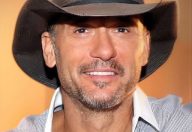‘Equus’ Rides Again, with Vigor, at The Public
- Like
- Digg
- Del
- Tumblr
- VKontakte
- Buffer
- Love This
- Odnoklassniki
- Meneame
- Blogger
- Amazon
- Yahoo Mail
- Gmail
- AOL
- Newsvine
- HackerNews
- Evernote
- MySpace
- Mail.ru
- Viadeo
- Line
- Comments
- Yummly
- SMS
- Viber
- Telegram
- Subscribe
- Skype
- Facebook Messenger
- Kakao
- LiveJournal
- Yammer
- Edgar
- Fintel
- Mix
- Instapaper
- Copy Link

When Alan (Spencer T. Hamp) is astride his favorite horse, Nugget (Ben Blazer), he’s king of the world—but a king-sized fall awaits them both.
Let’s get the naked Harry Potter stuff out of the way first. Peter Shaffer’s Equus—a sensational play of the 1970s—came roaring back into the spotlight ten years ago. The occasion was a London revival that featured Potter star Daniel Radcliffe, then 17, as the troubled teenager around whom the story revolves. The part required Radcliffe to perform a pivotal scene in the nude. And so, as one London critic put it, legions of fans crammed the theater “to gaze, even if only fleetingly, on Harry’s magic wand.”
Pittsburgh Public Theater’s production of Equus (through October 29) keeps the nude scene, but male exposure is hardly the main attraction. The play’s the thing. Equus is good. To use an apt cliché, you might call it scary good.
One caveat I’d put forth is that Equus is a thinking person’s play: a psycho-philosophical detective story. But if you do think—even if only involuntarily—you’ll find plenty to ruminate upon. And if you feel, as in “feeling your feelings,” you’ll get more than a few emotional jolts in the process.
A Boy and His Horses
Shaffer, a British dramatist, said he was inspired to write the play when a friend told him about a gruesome crime. Apparently a young Englishman had blinded horses by driving spikes into their eyes. Trying to imagine what might be behind such an act, Shaffer spun a fictional tale which in 1973 became Equus.
The perpetrator is a wary-eyed teen named Alan Strang (played at The Public by Spencer T. Hamp). At the start of the play he’s already in court custody, seemingly delusional and refusing to talk. A psychiatrist, Martin Dysart (Daniel Krell), is asked to evaluate Alan and, if possible, to treat him.
Dysart’s first session with the youth does not go well. Alan, hunched and fidgety, responds to questions by chanting jingles from TV ads: “Double your pleasure, double your fun, with double-good, double-good Doublemint gum!”
Then gradually, the doctor builds a rapport with his patient and the action unfolds in flashback, as a sort of case study narrated by Dysart. In further sessions he coaxes Alan to not just describe, but to re-live, incidents leading up to the dreadful night when he gouged out the eyes of six horses.
Along the way we meet various persons of interest. Alan’s parents turn out to be a loving mum (Nancy McNulty) who cannot understand her dear child’s cruelty, and a defensive dad (Timothy Carter) who blames it on mum. We also meet Jill (Jessie Wray Goodman), a friendly young stablehand who had gotten Alan the horse-grooming job that gave him access to his victims.
And we meet the horses. Played by six actors wearing skeletal horse heads made of metal tubing while they prance and stomp with hoof-like cleats on their feet, they are more than convincing. They evoke the magical feelings of awe that real horses can evoke, nuzzling their humans lovably one moment, rearing up fierce and intimidating the next.
But the horses are not the main attraction either. These animals—aided, at times, by eerie stage effects—serve to create the aura of mythical wonderment that lies at the heart of an all-too-human story. Here’s the scoop in brief.
Alan, reared by a sire and dam who are oddly at odds with one another, has constructed a myth-world of his own, complete with his own religion. He worships horses. And, he is sexually attracted to them.
So how does this fit with the horrid crime? Not telling. That’s spoiler material.
The Doctor’s Dilemma
What can be told, since it is tipped off early in Equus, is Dysart’s reaction to the secret world he has discovered his patient to be living in. The learned psychiatrist envies it. He finds Alan to have a spiritually (and erotically) charged passion that is deeply in touch with—with what? With the creative forces of life? With the elemental nature of life?

Who’s in charge? Doctor Dysart (Daniel Krell) has the upper hand but Alan has the horsepower.
Suffice it to say that Dysart grapples throughout the play with a paradox. On the one hand, Alan must be viewed as dangerously deranged. Clearly the kid’s private reality is not sustainable; he’s done violence to it himself.
But on the other hand, what kind of cure can the psychiatrist offer? One that strips away everything the young man believes in and cares about? One that returns him to a so-called “normal” state, which countless people in our advanced modern societies have found to be mostly empty, dull, and devoid of much real passion except for occasional bursts of profound annoyance and/or existential despair?
The language of Equus is much more colorful than the adjectives I’ve strung together trying to summarize it. At one point Dysart relates a nightmare he’s had about his profession: He is an ancient priest presiding over the sacrifice of 500 children, “yanking out their entrails” and “casting them on the floor” for his fellow diagnosticians to read. Yet in scene after scene, he pursues his investigation of Alan’s case relentlessly—only to be floored time and again by the next twist, and the next.
Talky though it is, Equus goes far beyond talking heads. The action is visceral; the tension builds; the revelations are gripping. It’s drama.
A Bit of the Old Cultural Context
There happens to be a back-backstory to Equus. The play was written at a time when rebellion against conformity was very much in the air. During the early 1970s, the Sixties weren’t over yet. And it was furthermore a time when other of the play’s themes were looming large, such as the logical rationality of modern science versus the more intuitive, earthy basis of older cultures—and the validity of the psychiatric approach.
Novels like One Flew over the Cuckoo’s Nest and A Clockwork Orange were being made into movies, with their stories of “mad” anti-heroes put into treatment. There was even a rebellion within psychiatry, led by figures including Dr. Thomas Szasz (author of The Myth of Mental Illness) and the rogue Scottish psychiatrist Ronald Laing, along with the novelist Doris Lessing writing newer anti-psychiatry-themed fiction such as Briefing for a Descent into Hell.
So, yeah, one could say Equus was a part of all that. What I like about the play is that it explores these issues, and more—religion (as distinct from spirituality) is a big one—without either (a) over-simplifying them or (b) making madness look overly glamorous.
Mental unbalance is serious business. Most of the time, there’s not a lot to recommend it as a desired M.O. Perhaps you know this from personal experience or close contact, as I do. Not to mention that we’re all living in a time when madness seems to be running rampant.
I would call it a fine time to go and see Equus. And I would call The Public’s production one that brings a crackling good play to life.
Closing Credits and Ticket Info
Equus is directed for Pittsburgh Public Theater by Ted Pappas, the company’s producing artistic director. Actors not named above are Amy Landis, Lisa Velten Smith, Philip Winters, and the horses: Ben Blazer, Michael Greer, Lawrence Karl, Ryan Patrick Kearney, Benjamin James Michael, and Luke Steinhauer. Scenic design is by James Noone, sound and original music by Zach Moore, lighting by Kirk Bookman, and costumes by Tilly Grimes.
Through October 29 at the O’Reilly Theater, 621 Penn Ave., Cultural District. For showtimes and tickets, visit The Public online or call 412-316-1600.
Photos: Michael Henninger
Mike Vargo, a Pittsburgh-based freelance writer and editor, covers theater for Entertainment Central.
Share on Social Media
- Like
- Digg
- Del
- Tumblr
- VKontakte
- Buffer
- Love This
- Odnoklassniki
- Meneame
- Blogger
- Amazon
- Yahoo Mail
- Gmail
- AOL
- Newsvine
- HackerNews
- Evernote
- MySpace
- Mail.ru
- Viadeo
- Line
- Comments
- Yummly
- SMS
- Viber
- Telegram
- Subscribe
- Skype
- Facebook Messenger
- Kakao
- LiveJournal
- Yammer
- Edgar
- Fintel
- Mix
- Instapaper
- Copy Link
Follow Entertainment Central
Sign up for the EC Newsletter
Latest Stories







